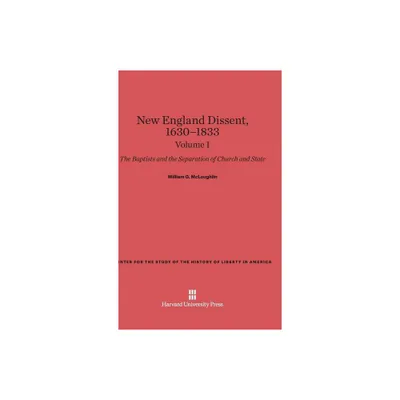Home
The Common Law in Colonial America: Volume I: The Chesapeake and New England 1607-1660
Loading Inventory...
Barnes and Noble
The Common Law in Colonial America: Volume I: The Chesapeake and New England 1607-1660
Current price: $84.00


Barnes and Noble
The Common Law in Colonial America: Volume I: The Chesapeake and New England 1607-1660
Current price: $84.00
Loading Inventory...
Size: OS
*Product Information may vary - to confirm product availability, pricing, and additional information please contact Barnes and Noble
William E. Nelson here proposes a new beginning in the study of colonial legal history. Examining all archival legal material for the period 1607-1776 and synthesizing existing scholarship in a four-volume series,
The Common Law in Colonial America
shows how the legal systems of Britain's thirteen North American coloniesinitially established in response to divergent political, economic, and religious initiativesslowly converged into a common American legal order that differed substantially from English common law.
Drawing on groundbreaking and overwhelmingly in-depth research into local court records and statutes, the first volume explores how the law of the Chesapeake coloniesVirginia and Marylanddiverged sharply from the New England coloniesMassachusetts Bay, Connecticut, New Haven, Plymouth, and Rhode Islandand traces the roots of these dissimilarities from their initial settlement until approximately 1660. Nelson pointedly examines the disparate motives of the legal systems in the respective colonies as they dealt with religion, price and labor regulations, crimes, public morals, the status of women, and the enforcement of contractual obligations. He reveals how Virginians' zeal for profit led to a harsh legal framework that efficiently squeezed payment out of debtors and labor out of servants; whereas the laws of Massachusetts were primarily concerned with the preservation of local autonomy and the moral values of family-centered farming communities. The law in the other New England colonies, Nelson argues, gravitated towards the Massachusetts model, while Maryland's law, gravitated toward that of Virginia.
Comprehensive, authoritative, and extensively researched,
The Common Law in Colonial America, Volume 1: The Chesapeake and New England, 1607-1660
is the definitive resource on the beginnings of the common law and its evolution during this vibrant era in America's history. William E. Nelson here proposes a new beginning in the study of colonial legal history.
The Common Law in Colonial America
shows how the legal systems of Britain's thirteen North American coloniesinitially established in response to divergent political, economic, and religious initiativesslowly converged into a common American legal order that differed substantially from English common law.
Drawing on groundbreaking and overwhelmingly in-depth research into local court records and statutes, the first volume explores how the law of the Chesapeake coloniesVirginia and Marylanddiverged sharply from the New England coloniesMassachusetts Bay, Connecticut, New Haven, Plymouth, and Rhode Islandand traces the roots of these dissimilarities from their initial settlement until approximately 1660. Nelson pointedly examines the disparate motives of the legal systems in the respective colonies as they dealt with religion, price and labor regulations, crimes, public morals, the status of women, and the enforcement of contractual obligations. He reveals how Virginians' zeal for profit led to a harsh legal framework that efficiently squeezed payment out of debtors and labor out of servants; whereas the laws of Massachusetts were primarily concerned with the preservation of local autonomy and the moral values of family-centered farming communities. The law in the other New England colonies, Nelson argues, gravitated towards the Massachusetts model, while Maryland's law, gravitated toward that of Virginia.
Comprehensive, authoritative, and extensively researched,
The Common Law in Colonial America, Volume 1: The Chesapeake and New England, 1607-1660
is the definitive resource on the beginnings of the common law and its evolution during this vibrant era in America's history. William E. Nelson here proposes a new beginning in the study of colonial legal history.


















